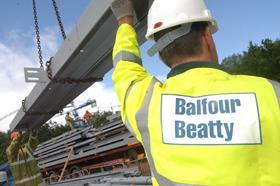The contractor reported that by November last year 10% of its workforce held non-British EU passports

Balfour Beatty has warned that Brexit could derail major infrastructure projects such as HS2 if the free movement of EU nationals is stopped and the industry is no longer able to “handpick” highly skilled engineers from other EU countries.
The contractor reported in a paper on the rail industry that in November last year over 10% of its workforce held non-British EU passports and 11% of the firm’s new recruits in 2016 held non-British EU passports. The firm added that the proportion of non-EU workers in it supply chain is even higher.
Balfour Beatty also revealed that it had specifically targeted Greece and Portugal with around 100 personnel recruited from these countries last year and a further 40-50 expected to join the contractor this year.
The firm said that at a time when there is a global shortage of engineers it was too difficult and costly to recruit from outside of the EU and therefore only 0.2% of its recruits last year came from outside Europe.
The skills shortage in the rail industry has reached a “critical” point, particularly in areas such as signalling and electrification, and could cause major delays and cost overruns to projects, Balfour Beatty said.
A failure to address the skills shortage could leave rail employers facing estimated costs of £316m a year by the end of CP6, while costs to government are estimated to be £381m per year by the end of 2024, as the shortage leads to wage inflation over the next five years of between 25%-40%, the contractor added.
Balfour Beatty said the pausing and un-pausing of CP5 schemes increased its difficulties in recruiting and training staff, which it needed to provide skilled labour for mega projects such as HS2.
Like other firm’s the contractor uses smaller schemes to recruit and train staff to ensure the skills are available for larger projects, but delays in smaller schemes being started meant skilled workers moved off to other industries with predictable workloads, Balfour Beatty reported.
The contractor said it supported the government’s efforts and its commitment to apprenticeships, but that developing the required skills takes time, adding that it can take up to a decade from starting an apprenticeship or training for someone to gain all the skills they need in specialist areas.
Balfour Beatty warned that if progress in addressing the skills gap does not significantly accelerate, the result will be increased construction costs, which would be counter-productive and inhibit delivery of projects.
Balfour Beatty also called for funding to be brought forward or supplemented via additional sources of investment for rail projects which it believes are at risk to ensure the pipeline of work from CP5 through to CP6 at a steady level to keep skilled workers in the rail industry.
Leo Quinn, Balfour Beatty chief executive, said: “The current combination of low-cost borrowing, a general appetite for infrastructure assets and growing demand for train capacity are a powerful catalyst for accelerating the development of our national rail network.
“However, the scale of investment this requires of the sector’s suppliers makes it imperative to provide long-term certainty in the project pipeline. This means cracking the code on the underlying funding model. The prize is to develop a world-class rail industry in terms of innovation and capability, and provide jobs for many thousands of people.”


























No comments yet